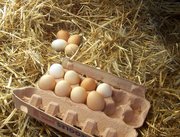Egg (food)
|
|
- This article is about bird eggs as food; for the eggs of sea animals, see roe and caviar, and for other meanings, see egg.
Bird eggs are a common food source. The most commonly used bird eggs are those from the chicken, duck, and goose, but smaller eggs such as quail eggs are occasionally used as a gourmet ingredient, as are the largest bird eggs, from ostriches. Eggs are frequently used in both sweet and savoury dishes as a source of protein and/or to bind the other ingredients in a recipe together. Sometimes the whole egg is cooked together. Sometimes the egg yolk is used separately from the egg white (or albumen).
The egg yolk is suspended in the egg white by one or two spiral bands of tissue called the chalaza (Greek word from "khalaza" meaning hailstone, or hard lump.)
| Contents |
Health issues
Nutrition
Some people try to avoid eggs in their diet because they are high in cholesterol. This issue is sometimes addressed by removing some or all of the eggs' yolks. People sometimes do this themselves, or may purchase prepared products such as Egg Beaters (TM). Still others use egg substitutes. A new type of designer eggs called "diet eggs" or "Omega eggs" has also been launched that contains six times more Omega 3 fatty acids, and less cholesterol and saturated fat. This was introduced as a healthy alternative to regular eggs though it is thrice as costly as a regular egg.
In addition, the egg industry launched its continuing "Incredible Edible Egg" campaign, which touts eggs as a healthy part of a balanced diet. They cite some nutritionists who say the cholesterol risk posed by eggs is not as bad as previously thought. Some egg promoters also argue that the type of cholesterol found in eggs is not bad for human health.
Sanitation and risk of contamination
Another health issue associated with eggs is contamination. Eggs exit a female bird via the cloaca, so care must be taken to avoid the eggs being contaminated with fecal matter. People harvesting their own eggs are advised to clean them by rubbing with a dry, rough material like sandpaper. Washing is discouraged, as egg shells are fairly permeable and water could actually flush some of the feces into the egg.
Most health experts advise people to cook their eggs thoroughly before eating them, as the heat is necessary to kill any infectious micro-organisms that may be present. Raw and undercooked eggs have been associated with salmonella infection. As with meat, ready-to-eat food should not come in contact with containers and surfaces that have been used to process raw eggs.
Ethical issues
Many who practice vegetarianism feel it is acceptable to eat eggs as the bird is not killed and the eggs remain unfertilised. People concerned about animal welfare (especially vegans) are reluctant to eat mass-produced eggs as factory farming is considered cruel. Even free-range eggs are sometimes unacceptable to those who are concerned about animal welfare as it is felt that alleged free-range birds may not be much better off than confined birds. Many vegans feel the view that eating eggs does not cause an animal to be killed is inaccurate since most farms (both free-range and factory farms) kill the chickens once their egg production declines. Most farms also buy the chicks from hatcheries where the male chicks are killed at birth.
Preparation
Missing image Potato_galettes_with_quail_eggs.jpg Potato galettes, served with quail eggs. The eggs of the quail are edible and are a popular delicacy. |
Missing image Egg_carton.jpg Chicken's eggs |
Missing image Raw_egg.jpg The inside of a raw egg |
The primary cooking techniques for eggs are:
Some common egg dishes are
Eggs, particularly their yolks, are important as binding agents in many preparations in European cooking due to the emulsifying action of lecithin. This property is crucial for sauces such as mayonnaise and Hollandaise, custards such as crème anglaise, crème brûlée, flan and lemon custard, and meat dishes such as sausages and pâté.
Eggs may also be pickled, hard-boiled and refrigerated, or eaten raw, though the latter is not recommended for people who may be susceptible to salmonella, such as the old, the infirm, or pregnant women.
When eggs become rotten, the yolk will turn green and the egg will emit a sulfurous smell when broken. Although deemed offensive by most Western palates, fermented eggs are considered a delicacy by some in China, when prepared using a special method which includes letting them sit for three months to age (or rot, depending on one's interpretation).
Alternatives
For those who choose not to or are unable to consume eggs, alternatives used in baking include other rising agents, such as Ener-G egg replacer, or binding materials, such as ground flax seeds. Tofu can also act as a partial binding agent, since it is high in lecithin due to its soy content. Extracted soybean lecitithin, in turn, is often used in packaged foods as a cheap substitute for egg-derived lecithin.
Shell colour preference
Different breeds of chicken can lay eggs varying from whites through to brown and rarer colours such as speckled green. Although there are absolutely no nutritional differences, there is often a cultural preference for one colour over another. For example, in most regions of the United States eggs are generally white, while in the northeast of that country, and in the United Kingdom eggs are generally light-brown. These habits may be associated with perceptions of greater purity in white-shelled eggs or greater wholesomeness in brown-shelled eggs.
See also
External links
- cruelty investigations at egg factory farms (http://www.EggCruelty.com/)
- criticism of the "Animal Care Certified" logo found on most eggs in the United States (http://www.eggscam.com/)
Template:Cookbookparca:Ou (aliment) da:Æg de:Ei es:Huevo (alimento) fr:Œuf (cuisine) it:Uovo ja:卵 nl:Ei pl:Jajo sv:Ägg

